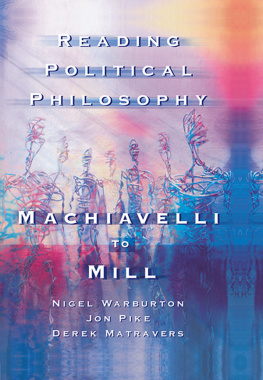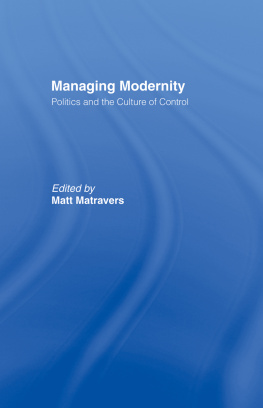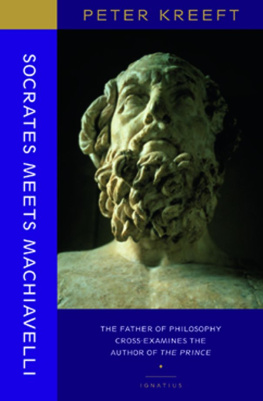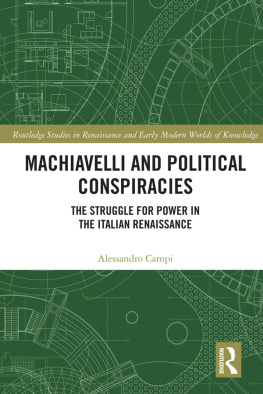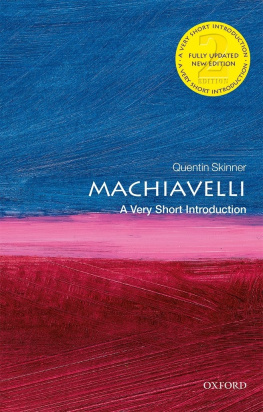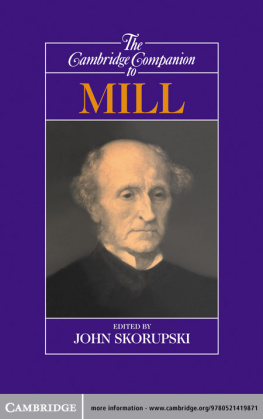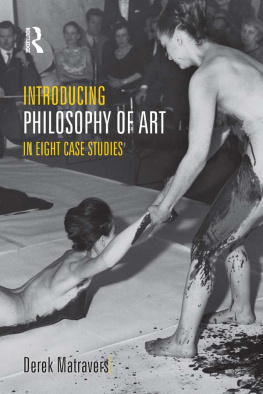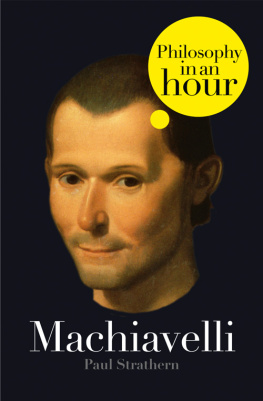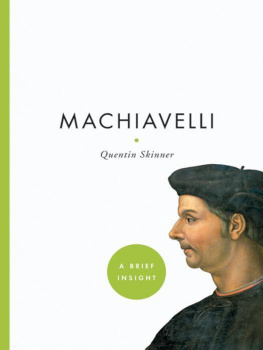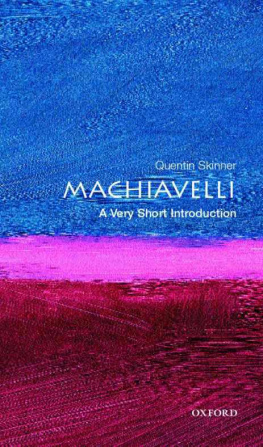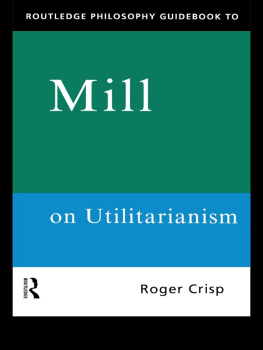Derek Matravers - Reading Political Philosophy: Machiavelli to Mill
Here you can read online Derek Matravers - Reading Political Philosophy: Machiavelli to Mill full text of the book (entire story) in english for free. Download pdf and epub, get meaning, cover and reviews about this ebook. year: 2014, publisher: Routledge, genre: Politics. Description of the work, (preface) as well as reviews are available. Best literature library LitArk.com created for fans of good reading and offers a wide selection of genres:
Romance novel
Science fiction
Adventure
Detective
Science
History
Home and family
Prose
Art
Politics
Computer
Non-fiction
Religion
Business
Children
Humor
Choose a favorite category and find really read worthwhile books. Enjoy immersion in the world of imagination, feel the emotions of the characters or learn something new for yourself, make an fascinating discovery.
- Book:Reading Political Philosophy: Machiavelli to Mill
- Author:
- Publisher:Routledge
- Genre:
- Year:2014
- Rating:4 / 5
- Favourites:Add to favourites
- Your mark:
- 80
- 1
- 2
- 3
- 4
- 5
Reading Political Philosophy: Machiavelli to Mill: summary, description and annotation
We offer to read an annotation, description, summary or preface (depends on what the author of the book "Reading Political Philosophy: Machiavelli to Mill" wrote himself). If you haven't found the necessary information about the book — write in the comments, we will try to find it.
Reading Political Philosophy: Machiavelli to Mill — read online for free the complete book (whole text) full work
Below is the text of the book, divided by pages. System saving the place of the last page read, allows you to conveniently read the book "Reading Political Philosophy: Machiavelli to Mill" online for free, without having to search again every time where you left off. Put a bookmark, and you can go to the page where you finished reading at any time.
Font size:
Interval:
Bookmark:
READING POLITICAL PHILOSOPHY MACHIAVELLI TO MILL
R EADING P OLITICAL P HILOSOPHY
M ACHIAVELLI TO M ILL
N IGEL W ARBURTON
J ON P IKE
D EREK M ATRAVERS

Published by Routledge in association with The Open University
2 Park Square, Milton Park,
Abingdon, Oxon, OX14 4RN
Simultaneously published in the USA and Canada
by Routledge
711 Third Avenue
New York, NY 10017
Routledge is an imprint of the Taylor & Francis Group, an informa business
First Published 2000
Reprinted 2006
Transferred to Digital Printing 2007
Written and produced by the Open University
Walton Hall
Milton Keynes MK7 6AA
Copyright 2000 The Open University
All rights reserved. No part of this publication may be reproduced, stored in a retrieval system, transmitted or utilizied in any form or by any means, electronic, mechanical, photocopying, recording or otherwise, without written permission from the publisher or a licence from the Copyright Licensing Agency Ltd. Details of such licenses (for reprographic reproduction) may be obtained from the Copyright Licensing Agency Ltd of 90 Tottenham Court Road, London W1P 0LP.
Edited, designed and typeset by The Open University.
British Library Cataloguing in Publication Data
A catalogue record for this book is available from the British Library
Library of Congress Cataloguing in Publication Data
[data confirmation forthcoming]
ISBN 041521196 4 (hbk) ISBN13: 9780415211963
ISBN 041521197 2 (pbk) ISBN13: 9780415211970
This book forms part of an Open University course AA311 Reading Political Philosophy: Machiavelli to Mill. Details of this and other Open University courses can be obtained from the Courses Reservation Centre, PO Box 724, The Open University, Milton Keynes MK7 6ZS, United Kingdom: tel. +44 (0)1908 653231.
For availability of this and other course components, contact Open University Worldwide Ltd, The Berrill Building, Walton Hall, Milton Keynes MK7 6AA, United Kingdom: tel. +44 (0)1908 858585, fax +44 (0)1908 858787, e-mail ouwenq@open.ac.uk
Alternatively, much useful information can be obtained from the Open Universitys website: http://www.open.ac.uk
AA311bk1i1.1
1.1
Publishers Note
The publisher has gone to great lengths to ensure the quality of this reprint but points out that some imperfections in the original may be apparent
Contents

The history of political philosophy includes many of the greatest and most widely studied works of philosophy, from Platos Republic through to John Rawlss A Theory of Justice. In this book we are focusing on seven works by indisputably great thinkers. These books are intrinsically interesting, in some cases qualify as significant works of literature, and, most importantly, contain ideas that have a continuing relevance beyond their original contexts of composition. Our book has been written in the firm belief that studying the history of philosophy should not be like a visit to a dusty museum of superseded thought, but rather a challenging and invigorating engagement with the ideas of the great thinkers of the past.
How to use this book
If you work through this book systematically you should emerge with an excellent grounding in political philosophy, one that should prepare you well for addressing issues within more recent political philosophy. Throughout, the emphasis is on thinking critically about the ideas expressed within these works. We have provided sufficient background material for an intelligent reading of each text studied, and have picked out what we take to be the central issues. We have indicated in our activity sections when it is appropriate to read from the classic texts, and when to turn to the associated readings. Some of the activities include exercises: it would be very simple to skip ahead and read our suggested answers, not bothering to answer the questions asked; however, you are unlikely to get the full value of studying this book unless you attempt to answer the questions for yourself. It has been written to be used, not absorbed passively, hence the emphasis on activities: you are strongly recommended to follow the guidance given by the authors on reading the set texts.
We have tried to pick out the most stimulating, useful and important readings on each philosopher to provide a balanced anthology of secondary reading as well as a guide to reading the primary texts. There is a brief glossary and suggestions for further reading at the end of each chapter; there is also a cumulative bibliography.
The editions of the primary texts we have chosen are particularly suitable for students at the Open University. Our grounds for selecting these editions include the usefulness of notes, glossaries, introductions and so on, and where relevant, the clarity and accuracy of the translation, and also, of course, the purchase price. The editions we have used are:
Niccol Machiavelli, The Prince, George Bull (trans.), Penguin Books, 1999 (new edn).
Thomas Hobbes, Leviathan, Edwin Curley (ed.), Hackett, 1994.
John Locke, Second Treatise of Government, C.B. Macpherson (ed.), Hackett, 1980.
Jean-Jacques Rousseau, Discourse on Political Economy and The Social Contract, Christopher Betts (trans.), Oxford University Press, Oxford Worlds Classics, 1994.
Karl Marx and Frederick Engels, The German Ideology, Part One, C.J. Arthur (ed.), Lawrence & Wishart, 1974 (2nd edn).
John Stuart Mill, On Liberty, Gertrude Himmelfarb (ed.), Penguin Books, 1974.
John Stuart Mill, The Subjection of Women, Susan M. Okin (ed.), Hackett, 1988.
You can, of course, read this textbook using different editions. We have tried to use the simplest referencing system wherever possible, so that you can locate the relevant passages regardless of the edition you are using: Machiavellis The Prince is referred to by chapter number, Hobbess Leviathan by chapter and paragraph numbers, Lockes Second Treatise by chapter and section numbers, Rousseaus The Social Contract by book and chapter numbers, Marx and Engelss The German Ideology by heading numbers in the Arthur edition (there is an appendix on p.264 below identifying paragraphs and Arthurs headings), Mills On Liberty by chapter numbers and page references to the Himmelfarb edition, and his The Subjection of Women by chapter numbers and page references to the Okin edition.
Acknowledgements
This book was written as the course text for the Open University course AA311 Reading Political Philosophy: Machiavelli to Mill The point of the course is to guide student reading of a range of classic texts in the history of political philosophy and to provide a selection of the best secondary reading on these works, relating ideas to present-day questions wherever appropriate.
Many people commented on drafts of the book at various stages of production. We are particularly grateful to Michael Clark, the external assessor of our course, who gave swift, meticulous and extremely useful feedback to us at every stage of writing. Thanks too to Vivienne Brown, whose detailed criticisms of an earlier draft greatly improved it. We are also grateful to the anonymous publishers readers. The contributors to the audio-cassettes which accompany the Open University course, Quentin Skinner, Jeremy Waldron, Alan Ryan, Jerry Cohen, Jonathan Wolff, Timothy OHagan and Janet Radcliffe Richards, helped us to refine our thinking about the philosophers they discussed, and in many cases commented on our draft material as well. We are also grateful to Carolyn Price, who read and commented on most of the chapters, to the course manager Jan Cant who helped co-ordinate our efforts, to the Open University editor Peter Wright, to Jonathan Hunt who co-ordinated co-publishing, and to Tony Bruce and Sarah Howlett of Taylor and Francis. We would also like to thank the various Open University secretaries who keyed in the chapters. Individual authors would also like to express their thanks to Matt Matravers, who commented on Chapters 4 and 5, and to Edward Garrett and Susan Robinson, who commented on Chapters 2 and 3.
Next pageFont size:
Interval:
Bookmark:
Similar books «Reading Political Philosophy: Machiavelli to Mill»
Look at similar books to Reading Political Philosophy: Machiavelli to Mill. We have selected literature similar in name and meaning in the hope of providing readers with more options to find new, interesting, not yet read works.
Discussion, reviews of the book Reading Political Philosophy: Machiavelli to Mill and just readers' own opinions. Leave your comments, write what you think about the work, its meaning or the main characters. Specify what exactly you liked and what you didn't like, and why you think so.

